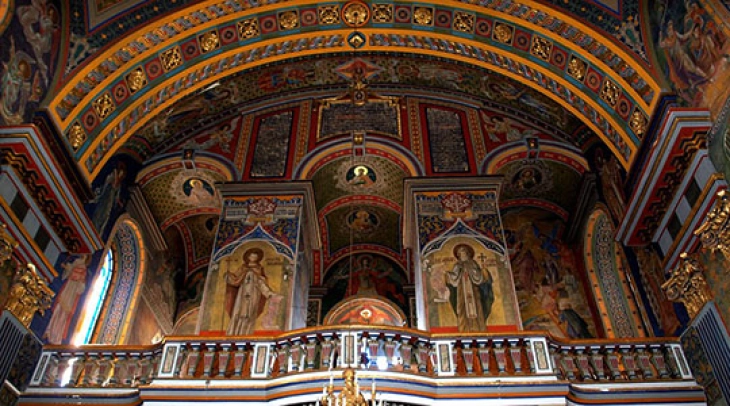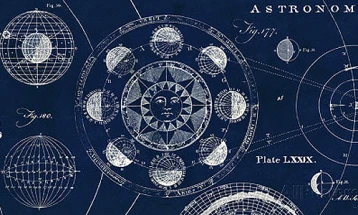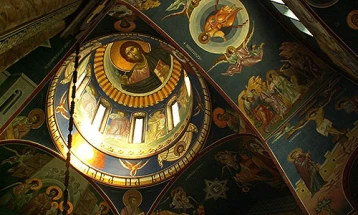Religious calendars
- 20 November 2024 (MIA)

20 November 2024 (MIA)
Macedonian Orthodox Church Calendar
The Holy 33 Martyrs of Melitene
He was born in the Cappadocian city of Tijane of a good and God-fearing mother, Stratonica, who was blind. Hieron was a very zealous Christian, and cared for his blind mother with a true filial love. Because of both his faith and his mother, he refused to go into the army, and fended off and drove away those who were sent to take him, for he was loath to leave his helpless, blind mother and be forced as a soldier to bow down and offer sacrifice to idols.
Finally, Hieron was seized and taken before the governor of the city of Melitene, along with other Christians. While they were on the road, a man in white apparel appeared one night to Hieron and said to him: ‘Behold, Hieron, I reveal to thee thy salvation: thou shalt not wage war for any earthly king, but shalt engage in a battle for the King of heaven, and quickly shalt thou come to Him and receive from Him both honor and glory.’ Hieron’s heart was filled with ineffable joy at these words. When they reached Melitene, they were all thrown into prison, where Hieron strengthened them all in their faith with great ardor, exhorting them that not one should fall away but that all should freely give their bodies over to torment and death for Christ. To a man, they all confessed their faith in Christ the Lord before the judge, except for one kinsman of Hieron’s called Victor, who repudiated his faith. Hieron’s hands were cut off, then he was flogged and tortured in various ways, until he was finally beheaded with the sword together with the others.
Going out to the place of execution, the thirty-three martyrs sang the psalm: ‘Blessed are those that are undefiled in the way, and walk in the Law of the Lord’ (Ps. 1:1). Let us remember by name these honourable martyrs, who are inscribed in the Book of Life: Hesychius, Nicander, Athanasius, Mamas, Barachius, Callinicus, Theogenes, Nikon, Longinus, Theodore, Valerius, Xanticus, Theodulus, Callimachus, Eugene, Theodochus, Ostrichius, Epiphanius, Maximian, Ducitius, Claudian, Theophilus, Gigantius, Dorotheus, Theodotus, Castrichius, Anicetas, Themilius, Eutychius, Hilarion Diodotus and Amonitus. A certain man called Chrysanthus found Hieron’s severed head and gave it burial and he later built over it a church in honor of St Hieron. One of the martyr’s hands was taken to his blind mother. St Hieron suffered with his companions in 298, and entered into the glory of Christ.
Catholic calendar
St. Felix of Valois
Born in 1127; died at Cerfroi, Nov. 4, 1212. He is commemorated on Nov. 20. He was surnamed Valois because, according to some, he was a member of the royal branch of Valois in France, according to others, because he was a native of the province of Valois. At an early age he renounced his possessions and retired to a dense forest in the Diocese of Meaux, where he gave himself to prayer and contemplation. He was joined in his retreat by St. John of Matha, who proposed to him the project of founding an order for the redemption of captives.
After fervent prayer, Felix in company with John set out for Rome and arrived there in the beginning of the pontificate of Innocent III. He was received with great enthusiasm, and King Philip Augustus authorized the institute France and fostered it by signal benefactions. Margaret of Blois granted the order twenty acres of the wood where Felix had built his first hermitage, and on almost the same spot he erected the famous monastery of Cerfroi, the motherhouse of the institute. Within forty years the order possessed six hundred monasteries in almost every part of the world. St. Felix and St. John of Matha were forced to part, the latter went to Rome to found a house of the order, the church of which, Santa Maria in Navicella, still stands on the Caeclian Hill.
St. Felix remained in France to look after the interests of the congregation. He founded a house in Paris attached to the church of St. Maturinus, which afterwards became famous under Robert Guguin, master general of the order. Though the Bull of his canonization is no longer extent, it is the constant tradition of his institute that he was canonized by Urban IV in 1262. Du Plessis tells us that his feast was kept in the Diocese of Meaux in 1215. In 1666 Alexander VII declared him a saint because of immemorial cult. Innocent XI transferred his feast to Nov. 20 in 1679.











